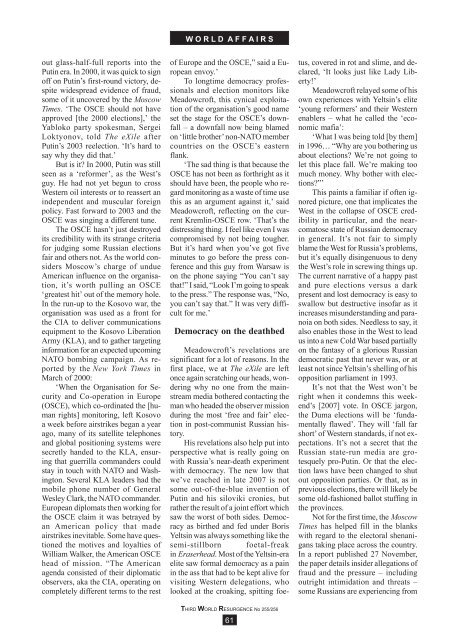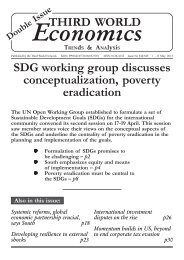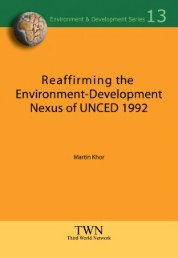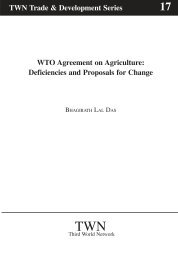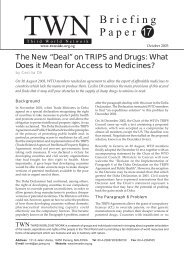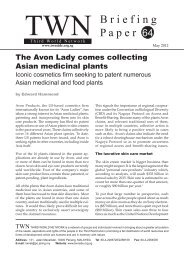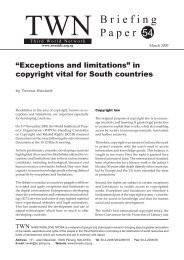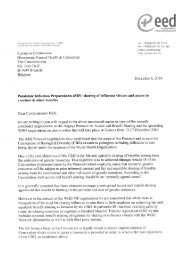Download - Third World Network
Download - Third World Network
Download - Third World Network
Create successful ePaper yourself
Turn your PDF publications into a flip-book with our unique Google optimized e-Paper software.
W O R L D A F F A I R S<br />
out glass-half-full reports into the<br />
Putin era. In 2000, it was quick to sign<br />
off on Putin’s first-round victory, despite<br />
widespread evidence of fraud,<br />
some of it uncovered by the Moscow<br />
Times. ‘The OSCE should not have<br />
approved [the 2000 elections],’ the<br />
Yabloko party spokesman, Sergei<br />
Loktyonov, told The eXile after<br />
Putin’s 2003 reelection. ‘It’s hard to<br />
say why they did that.’<br />
But is it? In 2000, Putin was still<br />
seen as a ‘reformer’, as the West’s<br />
guy. He had not yet begun to cross<br />
Western oil interests or to reassert an<br />
independent and muscular foreign<br />
policy. Fast forward to 2003 and the<br />
OSCE was singing a different tune.<br />
The OSCE hasn’t just destroyed<br />
its credibility with its strange criteria<br />
for judging some Russian elections<br />
fair and others not. As the world considers<br />
Moscow’s charge of undue<br />
American influence on the organisation,<br />
it’s worth pulling an OSCE<br />
‘greatest hit’ out of the memory hole.<br />
In the run-up to the Kosovo war, the<br />
organisation was used as a front for<br />
the CIA to deliver communications<br />
equipment to the Kosovo Liberation<br />
Army (KLA), and to gather targeting<br />
information for an expected upcoming<br />
NATO bombing campaign. As reported<br />
by the New York Times in<br />
March of 2000:<br />
‘When the Organisation for Security<br />
and Co-operation in Europe<br />
(OSCE), which co-ordinated the [human<br />
rights] monitoring, left Kosovo<br />
a week before airstrikes began a year<br />
ago, many of its satellite telephones<br />
and global positioning systems were<br />
secretly handed to the KLA, ensuring<br />
that guerrilla commanders could<br />
stay in touch with NATO and Washington.<br />
Several KLA leaders had the<br />
mobile phone number of General<br />
Wesley Clark, the NATO commander.<br />
European diplomats then working for<br />
the OSCE claim it was betrayed by<br />
an American policy that made<br />
airstrikes inevitable. Some have questioned<br />
the motives and loyalties of<br />
William Walker, the American OSCE<br />
head of mission. “The American<br />
agenda consisted of their diplomatic<br />
observers, aka the CIA, operating on<br />
completely different terms to the rest<br />
of Europe and the OSCE,” said a European<br />
envoy.’<br />
To longtime democracy professionals<br />
and election monitors like<br />
Meadowcroft, this cynical exploitation<br />
of the organisation’s good name<br />
set the stage for the OSCE’s downfall<br />
– a downfall now being blamed<br />
on ‘little brother’ non-NATO member<br />
countries on the OSCE’s eastern<br />
flank.<br />
‘The sad thing is that because the<br />
OSCE has not been as forthright as it<br />
should have been, the people who regard<br />
monitoring as a waste of time use<br />
this as an argument against it,’ said<br />
Meadowcroft, reflecting on the current<br />
Kremlin-OSCE row. ‘That’s the<br />
distressing thing. I feel like even I was<br />
compromised by not being tougher.<br />
But it’s hard when you’ve got five<br />
minutes to go before the press conference<br />
and this guy from Warsaw is<br />
on the phone saying “You can’t say<br />
that!” I said, “Look I’m going to speak<br />
to the press.” The response was, “No,<br />
you can’t say that.” It was very difficult<br />
for me.’<br />
Democracy on the deathbed<br />
Meadowcroft’s revelations are<br />
significant for a lot of reasons. In the<br />
first place, we at The eXile are left<br />
once again scratching our heads, wondering<br />
why no one from the mainstream<br />
media bothered contacting the<br />
man who headed the observer mission<br />
during the most ‘free and fair’ election<br />
in post-communist Russian history.<br />
His revelations also help put into<br />
perspective what is really going on<br />
with Russia’s near-death experiment<br />
with democracy. The new low that<br />
we’ve reached in late 2007 is not<br />
some out-of-the-blue invention of<br />
Putin and his siloviki cronies, but<br />
rather the result of a joint effort which<br />
saw the worst of both sides. Democracy<br />
as birthed and fed under Boris<br />
Yeltsin was always something like the<br />
semi-stillborn foetal-freak<br />
in Eraserhead. Most of the Yeltsin-era<br />
elite saw formal democracy as a pain<br />
in the ass that had to be kept alive for<br />
visiting Western delegations, who<br />
looked at the croaking, spitting foetus,<br />
covered in rot and slime, and declared,<br />
‘It looks just like Lady Liberty!’<br />
Meadowcroft relayed some of his<br />
own experiences with Yeltsin’s elite<br />
‘young reformers’ and their Western<br />
enablers – what he called the ‘economic<br />
mafia’:<br />
‘What I was being told [by them]<br />
in 1996… “Why are you bothering us<br />
about elections? We’re not going to<br />
let this place fall. We’re making too<br />
much money. Why bother with elections?”’<br />
This paints a familiar if often ignored<br />
picture, one that implicates the<br />
West in the collapse of OSCE credibility<br />
in particular, and the nearcomatose<br />
state of Russian democracy<br />
in general. It’s not fair to simply<br />
blame the West for Russia’s problems,<br />
but it’s equally disingenuous to deny<br />
the West’s role in screwing things up.<br />
The current narrative of a happy past<br />
and pure elections versus a dark<br />
present and lost democracy is easy to<br />
swallow but destructive insofar as it<br />
increases misunderstanding and paranoia<br />
on both sides. Needless to say, it<br />
also enables those in the West to lead<br />
us into a new Cold War based partially<br />
on the fantasy of a glorious Russian<br />
democratic past that never was, or at<br />
least not since Yeltsin’s shelling of his<br />
opposition parliament in 1993.<br />
It’s not that the West won’t be<br />
right when it condemns this weekend’s<br />
[2007] vote. In OSCE jargon,<br />
the Duma elections will be ‘fundamentally<br />
flawed’. They will ‘fall far<br />
short’ of Western standards, if not expectations.<br />
It’s not a secret that the<br />
Russian state-run media are grotesquely<br />
pro-Putin. Or that the election<br />
laws have been changed to shut<br />
out opposition parties. Or that, as in<br />
previous elections, there will likely be<br />
some old-fashioned ballot stuffing in<br />
the provinces.<br />
Not for the first time, the Moscow<br />
Times has helped fill in the blanks<br />
with regard to the electoral shenanigans<br />
taking place across the country.<br />
In a report published 27 November,<br />
the paper details insider allegations of<br />
fraud and the pressure – including<br />
outright intimidation and threats –<br />
some Russians are experiencing from<br />
THIRD WORLD RESURGENCE No 255/256<br />
61


